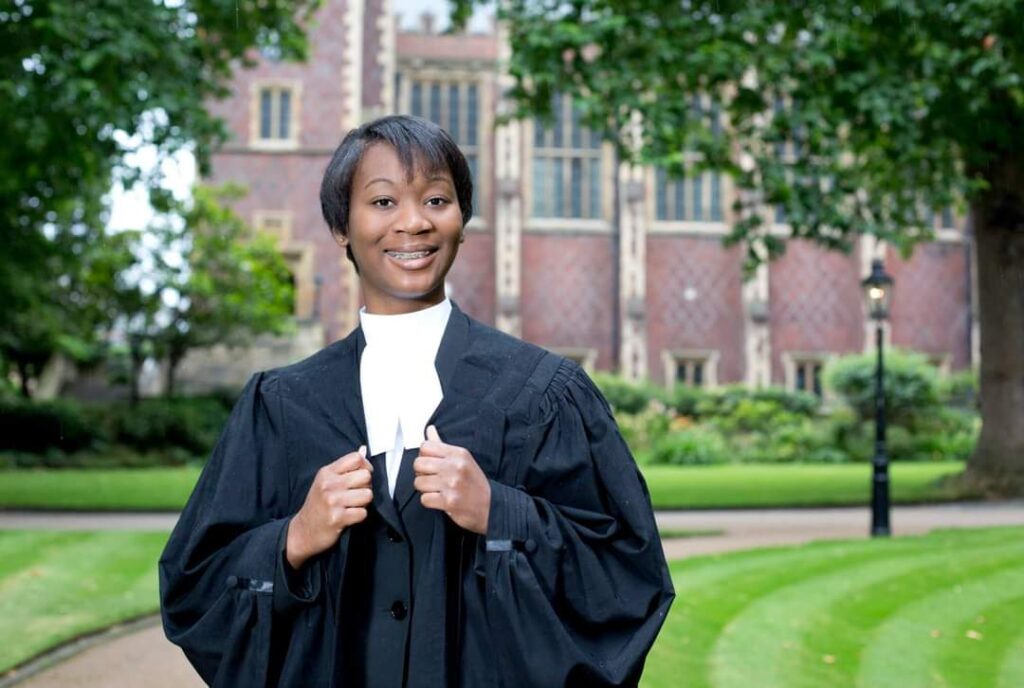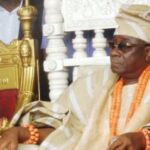While the average lawyer passes Great Britain’s “bar professional training course” at the age of 27, Gabrielle Turnquest was called to The Bar of England and Wales through the Honourable Society of Lincoln’s Inn on July 30, 2013, after passing her graduate diploma in law when she was 17.
An American teenager of black race became the youngest person in more than 600 years to become a qualified barrister in England and Wales. At the age of just 18, Gabrielle Turnquest was not even old enough to buy an alcoholic drink in her home town of Windermere, Florida, United States (US) but she became the youngest person ever to pass “The Bar” exams last year.
Gabrielle Turnquest is the youngest person in the history of the English legal system to be admitted to the bar. Photograph: Neil Hall/The University of Law
Her achievement, just like the achievements of Isabelita Hermonia (1632-1692), who was 10 years old when she was taken from her Elmina family in Gold Coast (now Ghana) to Spain in 1642 and studied paintings in Flemish, Spanish and Gothic styles and was reputed all over Europe; Anton Wilhelm Amo (c. 1703 – c. 1759), an Nzema native from Gold Coast and a polyglot who became a philosophy professor at Wittenberg University in Germany in 1734 and many other African intellectuals, goes to prove to the world that black (African) brain is not inferior to that of the Caucasian. It could be remembered that historians-cum-philosophers like Georg Wilhelm Friedrich Hegel, Karl Marx and David Hume claimed that blacks (Africans) have no history and lack intellectual excellence when compared with the Caucasians (whites). In fact, the respected British historian and philosopher, David Hume, wrote that:
‘I am apt to suspect the negroes and in general, all the other species
of men (for there are four or five different kinds) to be naturally
inferior to the whites. There never was a civilized nation of any other
complexion than white, nor even any individual eminent either in action
or speculation… Not to mention our colonies, there are Negroe slaves
dispersed all over Europe, of which none ever discovered any symptoms of
ingenuity; tho’ low people, without education, will start up amongst
us, and distinguish themselves in every profession.’
Though Amo wrote his 1738 “Treatise on the Art of Philosophising Soberly and Accurately,” in which he developed an empiricist epistemology, 15 years before Hume published his own work, which Hume and John Locke borrowed, proved black intellectual superiority. But the 2013 achievement of Ms Turnquest solidifies the averment that indeed Caucasian mind does not surpasses that of blacks (Africans).
Ms Turnquest, originally from Bahamas, is a well-known child prodigy and is no stranger in making history. At the age of 12, she was ahead of her classmates. She started her first degree at the age of 14, graduating two years later on the day she also graduated from high school. This firmly paved the way for the Florida teen to become the youngest to graduate with a degree from Liberty University in Virginia at the age of 16.
It was this acquisition of degree that served as a springboard for her to be called to The Bar through the Honourable Society of Lincoln’s Inn in Britain after passing her Graduate Diploma in Law at the University of Law when she was just 17.
After her graduation, the young history-maker told the Telegraph, “I guess it feels really good to have a law degree, rather than the age part of it. I am honored to be the youngest person to pass the Bar exams but, really, I was not aware at the time what the average age was.” She told the British Newspaper “I didn’t fully realize the impact of it.”
According to legal pundits and academics, the average lawyer passes the Bar Professional Training Course at the age of 27. But Gabrielle achieved that feat at the record age of 17 since the legal education in Great Britain commenced in over 600 years ago.
Interestingly, on that glorious day of graduation, Gabrielle was not the only child in her family to pass the UK Bar exam. Her sister, Kandi, also took the same course and passed the bar exams at the age of 22. It was indeed a family, class and sisters` act and also a bold statement for black (African) brains.
Not many people knew how young Gabrielle was at the University of Law, where she was studying with her 22-year-old sister. Most of the other students were in their mid-20s, although there were much older people too. “I think once people figured it out, there was shock,” she says, “I think that we had assumed that I was the youngest but there hadn’t been any confirmation. Then it was all over with and we got back to studying.”
It must be noted that though Gabrielle and sister, Kandi schooled in the US, but they were eligible for the English Bar because their parents are from Nassau, Bahamas. Gabrielle plans to return to the Bahamas and practise there.
Bahamas and Ghana
Bahamian culture is a hybrid of African, European, and other cultures. While English is the official language of the Bahamas, a vast majority of the population speaks Bahamian dialect. In Bahamian dialect, some African (Akan, Kongo, Yoruba, Fulani etc,.) words and expressions have been retained. Various West African peoples contributed musical instruments and styles, forms of dance, religious concepts, folktales, family patterns, and linguistic influences. In terms of folktales, West African Akan (Ghana and Ivory Coast) Anansi or Anancy (spider) story is ever-popular among the Bahamians just like all the other Caribbean nations.
Gabrielle Turnquest and her mum, Patrice Smith-Bullard
The Akan presence, especially that of the coastal Akan Fante people, is very visible and popularized in a form of the Junkanoo festival. Junkanoo is the corruption of the name of a Fante man called John Kweenu (John Quainoo) whose name became John Connu among the Bahamians. John Connu (Quainoo), a headman or Fante leader, brought the Fante traditional zombie-like costume they put up in every Fante festival to the New World (Americas). “Junkanoo” is a Mardi Gras-like celebration that is held on several secular holidays. The celebrations combine music, costume, dance, revelry, pride in the African cultural heritage, recognition of slave resistance to authority, and the unity of the people. Junkanoo “gangs” compete for prestige and cash prizes.
With this background of apparent West African origin, especially overwhelming presence of Fante culture and people in the Bahamas, it is likely that Gabrielle Turnquest has a Ghanaian ancestry.
Mother`s positive influence
Ms Turnquest is the third of six children. Are they all high achievers? “We try to be,” she says with a laugh. Their mother, Patrice Smith-Bullard, can take much of the credit for their academic success. A lawyer from Nassau in the Bahamas, she moved the family there from Florida when Gabrielle was a child. Deciding the school system was not challenging enough for her bright kids, she spent several months researching curriculums from around the world, looking at which countries were doing best in which subjects and why.
Then she turned all that into her own educational plan, rented space in her office building, hired teachers and enrolled her children onto a programme she named Excelsior Academy. She even made a school uniform for them.
When Gabrielle was 12, the family moved back to the US and the children went back to schools. By this time, she was far ahead of her classmates.
Young law prodigy, Gabrielle Turnquest, could have Ghanaian ancestry
She got to high school the following year and was able to take more advanced courses. She started a degree in Psychology when she was 14. Gabrielle’s university classmates knew she was still a high-school student, though most assumed she was a senior (around 17).
When a mentor suggested she might not be taken seriously as a counsellor at such a young age, Gabrielle thought about what to do next. Her sister had applied to study law in London and she thought this would be a good next step. “I guess the same could be said [about her age] for law, but it seemed as though there would be more opportunities to do behind-the-scenes work and the age thing would never come up.”
On the concerns that her mother pressured her to study hard to achieve her enviable record, Gabrielle insists there was not any pressure to excel. In fact, she says, because she wasn’t comparing herself to her peers, she did not really know what was expected of her. She just soaked up as much information as she could take, regardless of what age range it was aimed at. “My mother never gave us the impression that we were expected to complete everything,” she says.
Although Gabrielle could have stayed in the UK and become a barrister, but looking through her exceptional future crystal ball, the history-making teen plans to attend the Fashion Institute of Design and Merchandising in the US to study Apparel Industry Management.
“Studying at the University of Law has broadened my horizons and introduced me to a global legal system that will help me in my future career in the international fashion industry,” the teen said in a 2013 press release about her accomplishment. Her ultimate goal is to build a career as a fashion law specialist.
So, does she ever feel that she has missed out on anything; that she has moved too fast? “I guess I missed out on going to university with the people I knew before, but I’ve met a great group of people going to university the way I did. I now have this time to figure out what I’m going to do next and I already have a degree, so I have more opportunities open to me. I honestly don’t think I’ve missed out. I don’t think there was anything I could have done at 15 or 16 that I can’t do now – just with a law degree.”
Ms Turnquest who wears braces on her teeth and watches “a lot” of Law & Order continued to praise her mother, Patrice Smith-Bullard, who helped her to “get around all the obstacles.” She puts her achievement as the youngest person to qualify as a barrister down to two things. The first is her personal hard work. The second is the extraordinary drive of her “barracuda mum”.
As the saying goes “the sky is the limit.” We cannot wait to see what the future holds for this talented young woman. Once again, the black gene has proved that indeed it is not inferior to any human gene. It is rather the oldest gene and all human genes came out of it biological bifurcations. The achievement of Gabrielle Turnquest is evidence of Africa`s ancient glories shinning to prove the essence of the original human gene from Africa, the Mother continent.


